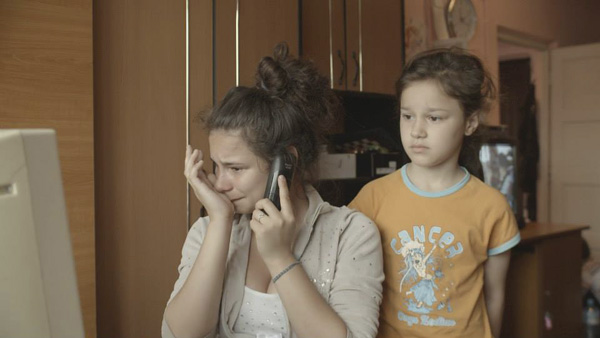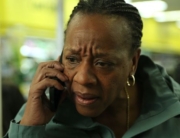As the documentary opens, it’s winter in Romania. In an apartment in a social housing complex in Bacau, Georgiana chops up chicken and potatoes while her younger siblings take turns talking on the phone with their mother. “Are you in Italy yet?” asks the youngest boy, George. “Yes, my love,” answers his mother. “Will you come home in the summer?” “In the summer I’ll come home,” she tells him. The mother, Liliana, has had to leave Romania to find a job that enables her to support her seven children. As the oldest of the three daughters, Georgiana has taken on the role of head of household while her mother is gone. She will celebrate her 15th birthday soon after her mother’s departure.
The film unfolds through uncensored footage taken mostly in and around the apartment. Georgiana handles the household chores, cleaning and cooking, while her slightly younger sister, Lacramioara, assists with the three youngest. An older brother, Ionut, is in charge of the money their mother sends for food and school needs, but it’s Georgiana to whom they all turn for direction. There is almost always a TV on or a video game in progress, and, at first, it appears there is very little structure to their lives. Their days end with the TV still on as they fall asleep in a pile like kittens. But, as time passes, we begin to see a routine emerge with even the youngest taking on a share of the day-to-day responsibilities.
Georgiana, for her part, struggles to balance school and home. In seeing that all the others get off to school on time, she races into class at the last minute, finding little time to focus on her studies and foregoing any kind of social life. In addition, she has to hide her situation from anyone in authority who might call in social services. She handles it all with remarkable maturity, obviously having inherited her mother’s sense of practicality. “That is life,” her mother tells her.
The film is marred in the beginning by the presence of the camera, which is obvious by the way it attracts the children’s attention. The viewer has to wonder if director Teodora Ana Mihai provides the adult presence that accounts for the children’s cooperation with one another and Georgiana’s calm in the face of her overwhelming responsibilities. Still, the love and sense of family they share is evident and genuine.
There is little in the way of drama here, no fancy cinematography or mood setting soundtrack. Mihai captures the children’s daily existence with the same straightforward, nonjudgmental practicality with which Liliana and Georgiana approach their lives. What viewers take away from this film is largely dependent on what they bring to it, and therein lies its art.
As summer, and the documentary, draw to a close, Liliana returns home as promised, but she is soon overheard in a phone conversation seeking another job that will likely take her away from her children yet again.







Leave A Comment